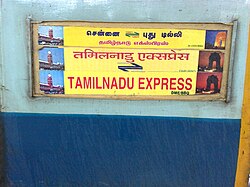Tamil Nadu Express
 |
|||||
| Overview | |||||
|---|---|---|---|---|---|
| First service | August 7, 1976 | ||||
| Current operator(s) | Indian Railways | ||||
| Route | |||||
| Start | Chennai Central | ||||
| Stops | 10 | ||||
| End | New Delhi | ||||
| Distance travelled | 2,184 km (1,357 mi) | ||||
| Average journey time | 32 hours | ||||
| Service frequency | Daily | ||||
| Train number(s) | 12621 / 12622 | ||||
| On-board services | |||||
| Class(es) | AC 1st Class, AC Two Tier, AC Three Tier, Sleeper Class | ||||
| Seating arrangements | Yes | ||||
| Sleeping arrangements | Yes | ||||
| Catering facilities | Yes | ||||
| Observation facilities | ICF Coaches | ||||
| Technical | |||||
| Track gauge | 1,676 mm (5 ft 6 in) | ||||
|
|||||
| Route map | |
|---|---|
 |
The Tamil Nadu Express or T.N. Express is a passenger train route of the Indian Railways. The train was first started on 7 August 1976 by then Prime Minister, Indira Gandhi. Introduced as a tri-weekly, it was the first State named train of the south. It runs between Chennai Central and New Delhi. It is considered as the fastest non-Rajdhani Express train. In 1976, it was a tri weekly train, then made four times a week just before the 1982 Asian Games and then converted to a daily train by Madhav Rao Scindia in June 1988 and who added Gwalior to the stoppages. Numbered 12621/12622, this train belongs to the Superfast category of Indian Railways.
When first introduced, the train was numbered 121/122 and the train had 13 compartments and was hauled by a single WDM 2 locomotive. After the Madras to Vijayawada line was electrified, the train was hauled by a single WAM 4 electric on that stretch, and a single WDM 2 from Vijayawada to New Delhi. When the Chennai - New Delhi line was partially electrified in the late 1980s, it had to change engines twice in the route, from WAM 4 to WDM 2 at Vijayawada and then from WDM 2 to WAM 4 at Itarsi Junction. When it was a non-daily train, it shared time slots with Andhra Pradesh Express and Kerala Express. The train from Delhi previously split at Katpadi (Vellore) or Jolarpettai, with corresponding train sets departing to Bangalore and Trivandrum (now called Thiruvananthapuram). Similarly, the two portions used to combine at one of these stations and operate to New Delhi.
...
Wikipedia
